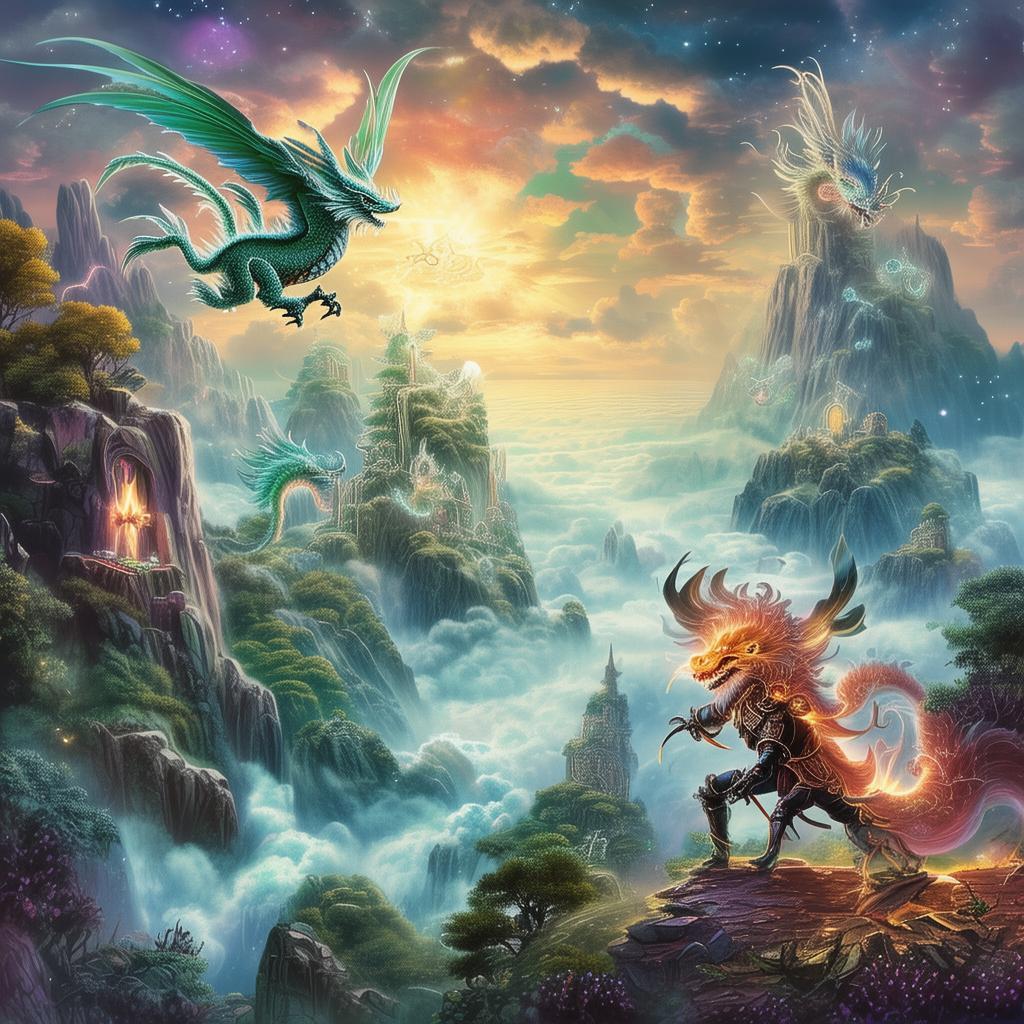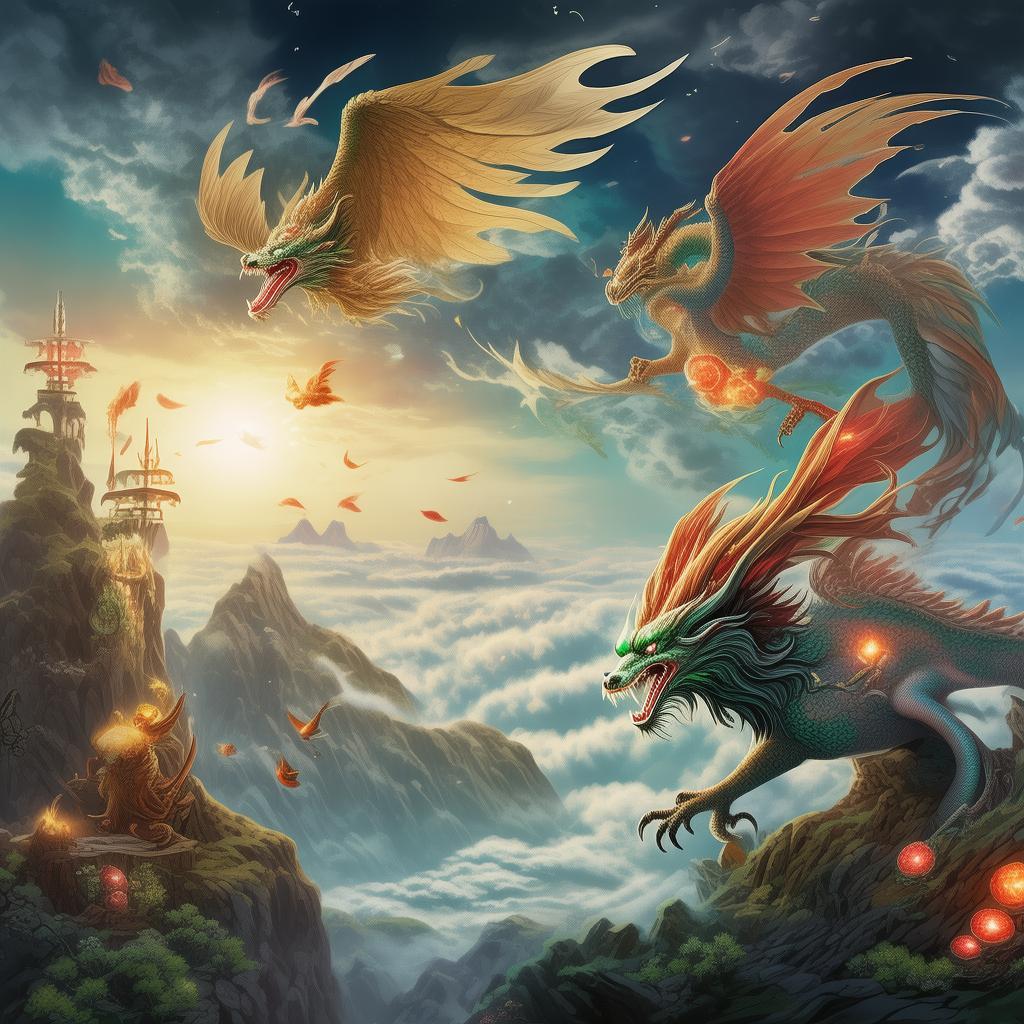The Apple of the Ancients: The Rivalry of the Three Princes
In the heart of the lush and verdant Apple Empire, where the fruits of the earth were said to be the sweetest, three princes stood at the precipice of destiny. Each born of the line of a great king, they were destined to rule with wisdom and justice. Yet, their destinies were not to be so peaceful.
The Apple of the Ancients was a mystical fruit, said to have been plucked from the very Tree of Knowledge itself. It was rumored to grant its possessor the power to bend the will of nations and control the very elements. This was the prize for which the princes would vie, for the throne of the Apple Empire was a seat of immense power and influence.
The first prince, Lior, was known for his cunning and strategic mind. He sought the Apple with the intent to rule with an iron fist, ensuring that the empire would never be threatened by external foes. His advisors whispered of his plans to fortify the borders and amass the greatest army the land had ever seen.
The second prince, Elara, was a warrior of unparalleled strength and valor. She sought the Apple not for power but for the protection of her people. She believed that with the Apple’s power, she could ensure that the Apple Empire would remain a sanctuary of peace and prosperity.
The third prince, Kael, was a scholar and a seer, whose heart was filled with a desire to understand the mysteries of the universe. To him, the Apple was a key to unlocking the secrets of the cosmos, and he sought it with a mixture of reverence and curiosity.
The rivalry between the princes was as old as the Apple Empire itself, and it was not just a contest for power but a struggle for the very soul of the empire. The people of the Apple Empire watched with bated breath, unsure of which prince would rise to the occasion and claim the Apple.
One day, as the seasons changed and the leaves turned to a blaze of autumnal colors, the three princes set out on their separate quests. Lior, clad in armor that glittered like the sun on the sea, led his army into the dark and treacherous forest that lay to the north. Elara, her armor forged from the strongest steel, led her warriors into the wilds to the east, where the winds howled and the mountains loomed like titans. Kael, dressed in robes that whispered secrets of the stars, journeyed into the desert to the west, where the sun baked the sands and the sands whispered of ancient wisdom.
As each prince ventured deeper into the unknown, they encountered trials and tribulations that tested their resolve. Lior faced a labyrinth of mirrors that reflected his fears and doubts, making him question his every move. Elara had to confront the might of a beast that guarded the passage to the Apple, a creature that represented the very darkness she sought to overcome. Kael, in the desert, was guided by a mysterious figure who spoke in riddles and offered cryptic advice, challenging his understanding of the world.

In the midst of their trials, the princes were joined by a group of mysterious figures, each of whom had their own reasons for seeking the Apple. There was the sorceress who sought eternal youth, the knight who sought to save his kingdom from ruin, and the thief who sought only to enrich himself.
As the princes and their allies delved deeper into the heart of the quest, they discovered that the Apple of the Ancients was not merely a physical object but a symbol of something greater. It was a test of character, a trial of the soul, and a challenge to the very essence of what it meant to be a ruler.
The climactic moment arrived when the three princes found themselves at the base of the Tree of Knowledge, its branches heavy with the scent of ancient magic and its leaves shimmering with an otherworldly light. Before them lay the Apple, its skin a deep, glowing red that seemed to pulse with a life of its own.
In a moment of profound silence, the princes were approached by an ancient entity, a guardian of the Apple, who revealed the true nature of their quest. The Apple was not a mere object of power, but a force of nature that could only be wielded by one who was truly worthy. It would not be given to the strongest, the cunningest, or the most learned, but to the one who could answer the guardian’s riddle and prove their worthiness.
The riddle was a test of wisdom and compassion, and the princes, each with their own strengths and weaknesses, grappled with the answer. As they pondered the guardian’s words, the essence of their characters shone through, revealing the true nature of their hearts.
Lior, though cunning, revealed his desire for power over others, and the guardian knew that the Apple would corrupt him. Elara, though brave, revealed a deep-seated fear of vulnerability, and the guardian saw that the Apple would only embolden her further. Kael, though wise, revealed a selfless love for knowledge and the greater good, and the guardian knew that he was the one who would wield the Apple without corruption.
With a nod of approval from the guardian, Kael reached out to take the Apple, and as he did, the world around him seemed to change. The Tree of Knowledge shimmered, and the Apple seemed to grow in his hand, a symbol of his newfound power. Yet, Kael knew that this power was not for him alone, but for the people of the Apple Empire and for the world beyond.
As he held the Apple, Kael was faced with a decision. He could claim the throne and rule with the power it granted, or he could share it with his brothers, believing that together they could rule with wisdom and compassion. In the end, he chose to share the Apple, and as he did, the world around him seemed to align with his choice.
The princes returned to the Apple Empire, the Apple now divided among them, each piece imbuing them with a portion of its power. Lior learned to rule with justice, Elara to protect with humility, and Kael to govern with wisdom. The Apple Empire thrived under their rule, and the legend of the Apple of the Ancients became a tale of hope and unity, a reminder that true power lay not in the object itself, but in the hearts of those who wielded it.
And so, the Apple of the Ancients remained a symbol of the balance between power and humility, a tale that would be told for generations to come, a reminder that the greatest strength is found in unity and the greatest wisdom in selflessness.
✨ Original Statement ✨
All articles published on this website (including but not limited to text, images, videos, and other content) are original or authorized for reposting and are protected by relevant laws. Without the explicit written permission of this website, no individual or organization may copy, modify, repost, or use the content for commercial purposes.
If you need to quote or cooperate, please contact this site for authorization. We reserve the right to pursue legal responsibility for any unauthorized use.
Hereby declared.









